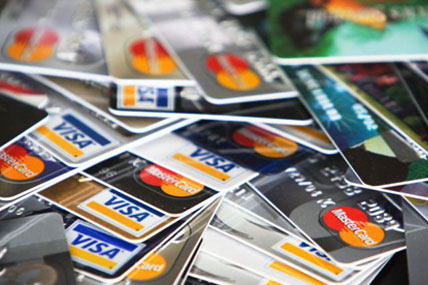When it comes to the payment of choice, plastic reigns supreme. Gone are the days of carrying wads of cash in our wallets, replaced instead with the choice to pay by “debit or credit” -- an automatic decision we rarely give a second thought.
For most of us, the decision to pay by credit or debit will depend on our personal financial situation, which usually revolves around the cash we have on hand. In some cases, however, there are other factors to consider. When choosing between debit and credit, here are some of the main advantages and disadvantages to consider.
Credit Cards
A credit card is essentially a loan, or line of credit that allows you to finance purchases now, in exchange for payment later. Primarily used as a short-term financing option, credit cards carry pre-set credit limits and charge interest on balances that are carried over from month to month.
Pros:
- Financial flexibility. From making a large purchase to covering unexpected financial emergencies, credit cards allow us much more financial flexibility than a debit card would. The key is knowing your financial limits and abiding by them.
- Fraud protection. In the event your credit card is compromised or stolen, you are legally protected under the Fair Credit Billing Act. For fraud and theft cases, your financial liability on unauthorized charges is capped at $50 -- and even then, most credit card issuers will waive the fee for cardholders.
- Purchase protections. Many credit card companies offer warranty and other purchase protections on items or merchandise you buy. If the product is faulty or breaks, your credit card may have protections in place to cover them.
- Can help build or establish credit. Credit card accounts are reported to the credit reporting agencies by the credit card issuer or lender. If managed responsibly, credit cards can help you build or rebuild credit.
Cons:
- Credit card debt. The temptation to overspend is one of the biggest drawbacks to using credit cards, and can lead to overwhelming credit card debt if you’re not careful. The longer it takes to you pay down your balance, the more it will cost you in interest. The more it costs you, the harder it is to dig yourself out -- it’s a vicious cycle. Watch your spending and only charge what you can comfortably afford to pay off each month and you’ll avoid the headache.
- Interest charges. Credit card issuers make money by charging interest on any balances you carry. If you always pay the balance in full, interest won’t be a concern. If you tend to carry a balance, accruing interest charges can get expensive and can cause you to fall further into debt if you’re not careful.
Debit Cards
A debit card is nothing more than a plastic check with a Visa or MasterCard logo. It works just like a credit card except that it’s tied directly to your checking account instead of a credit line and corresponding credit limit.
Pros:
- More convenient than a check. Using your debit card is fast, efficient and much more convenient than writing a personal check. In a matter of seconds you can swipe your card, enter your PIN, grab your bags and be on your way -- and the payment amount is immediately paid with funds from your checking account.
- Less likely to overspend. When you pay by debit, you’re basically paying in cash. This means you can only spend what you have available in your checking account, no more. So unlike credit cards, the temptation to overspend and fall into debt is much less likely when you pay by debit card.
- No interest charges. When you pay with a debit card you’ll never need to worry about interest charges on the purchase amount because you’re using your money, not the bank or lender’s. No interest charges means more money in your bank account and less to your credit card issuers.
Cons:
- Does not build credit. Debit cards are not credit cards, they’re plastic checks and have no impact on your credit because checking accounts and debit card activity are not reported in your credit reports.
- Limited fraud protections. Because debit cards are tied directly to a bank account, fraud and security precautions are extremely important. If you shop online, play it safe and use a credit card. In the event your card is lost, stolen or compromised, it’s imperative that you report it immediately so that your bank can take security measures to prevent further attempts to access your funds. If you report the theft immediately, you have zero liability -- but it could take several days to get your money back. If you report the theft within two business days of the transaction, your liability is limited to $50. If reported within 60 days, your liability jumps to $500. If more than 60 days pass, you’re liable for the entire amount.
- Watch out for bank fees. Depending on the financial institution, your debit card may carry fees that you may not be aware of, including monthly service charges, transaction fees, or penalty fees for not maintaining a specific balance. It’s worth the time to double check with your bank.
- Account holds can tie up your cash. This happens most often at the gas pump when you swipe your debit card to preauthorize your purchase. Because your exact purchase price is unknown, the merchant will place a hold to make sure you have enough funds in your account to cover the gas purchase. These holds can range from $50-$100 and may take a few days to clear.
- Not always accepted in lieu of credit cards. Have you ever tried to rent a car or reserve a hotel room with a debit card? It’s not pretty. In fact, most car rental companies require a credit card and refuse to accept a debit card at all. If they do accept debit, you can expect them to hold a large deposit to cover any damages or liability charges while you’re renting the car. Most hotels will accept a debit card but you should expect the same type of holds, usually the cost of one night’s room charges. If you don’t want to tie up your cash with exorbitant holds and deposits, a credit card is a much better option in this case.
There are both advantages and disadvantages to paying with a debit card versus a credit card. For most of us, using a combination of the two gives us a lot more flexibility and choice in how we manage our finances. Making the right choice for the right purchase situation means understanding the differences between the two.
-- Deanna Templeton is a financial literacy advocate with 15+ years in the banking and consumer credit industries, including five years with FICO in their credit scoring division. She specializes in educating consumers on the importance of healthy credit management, and shares valuable insight on consumer credit and finance issues.












